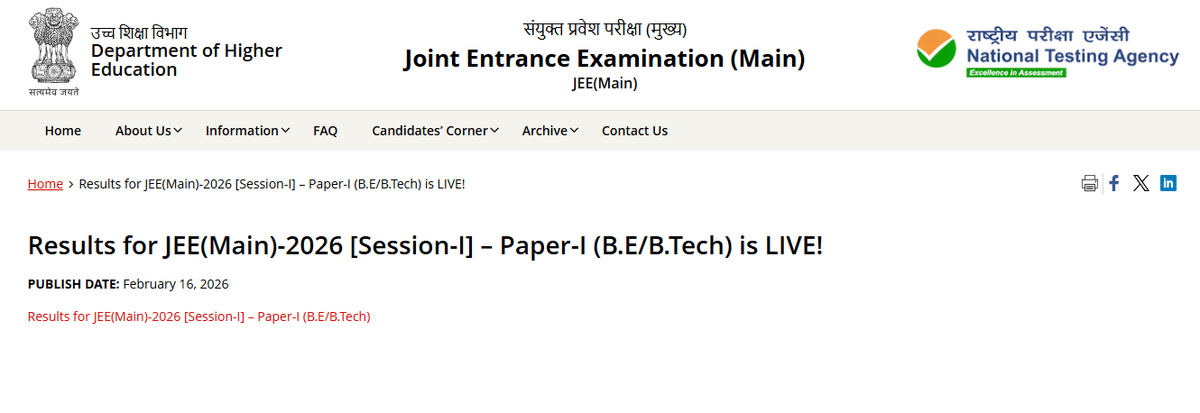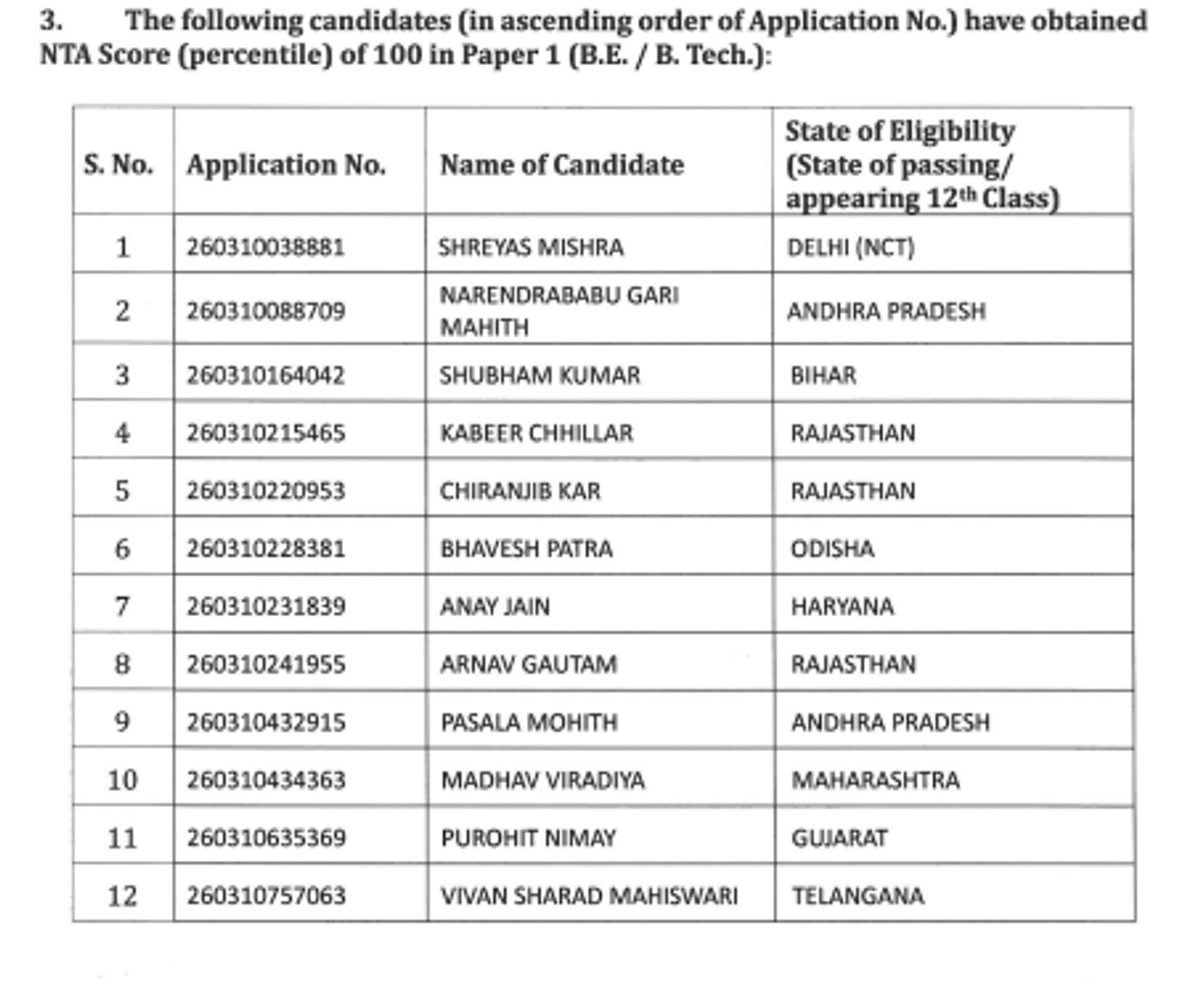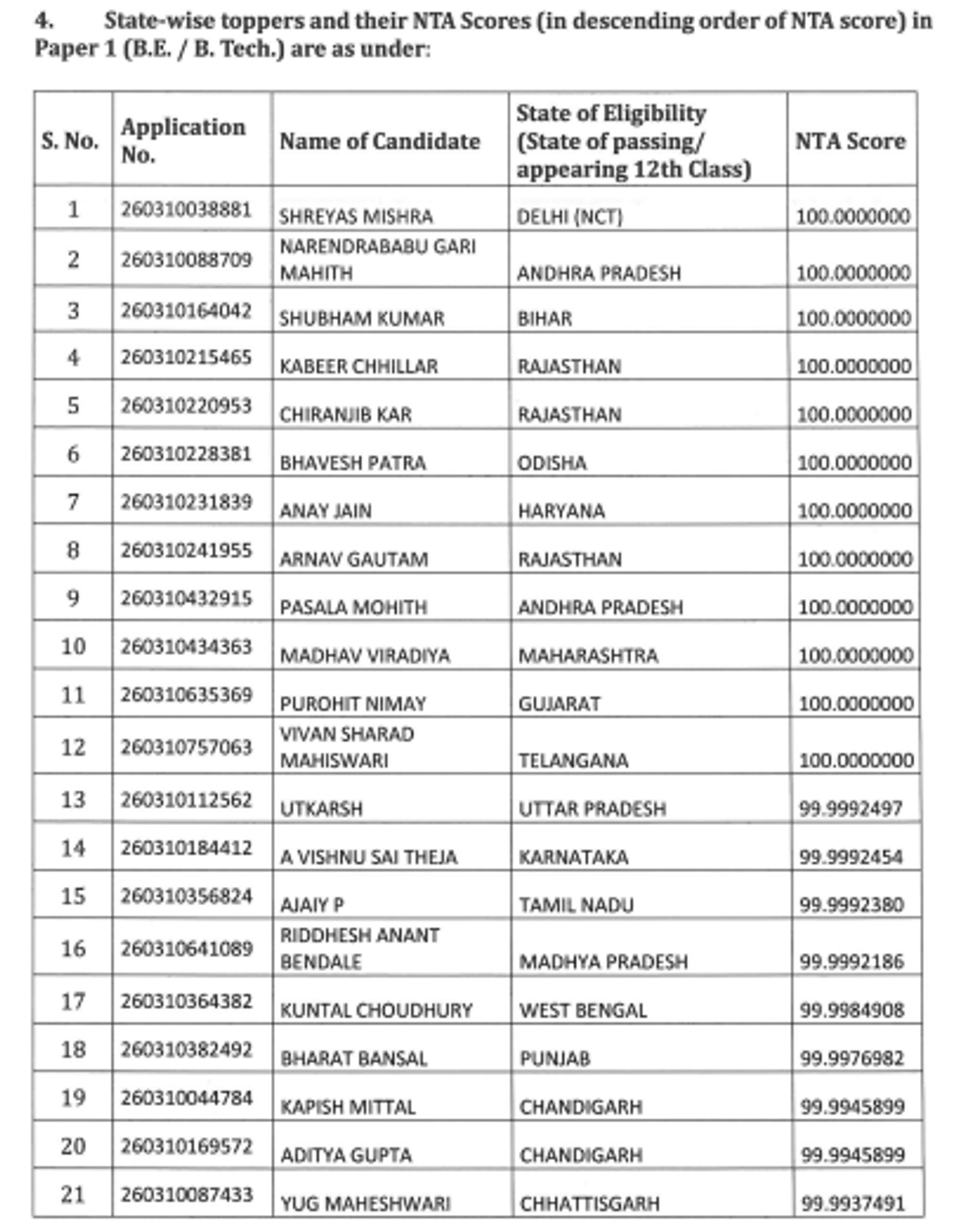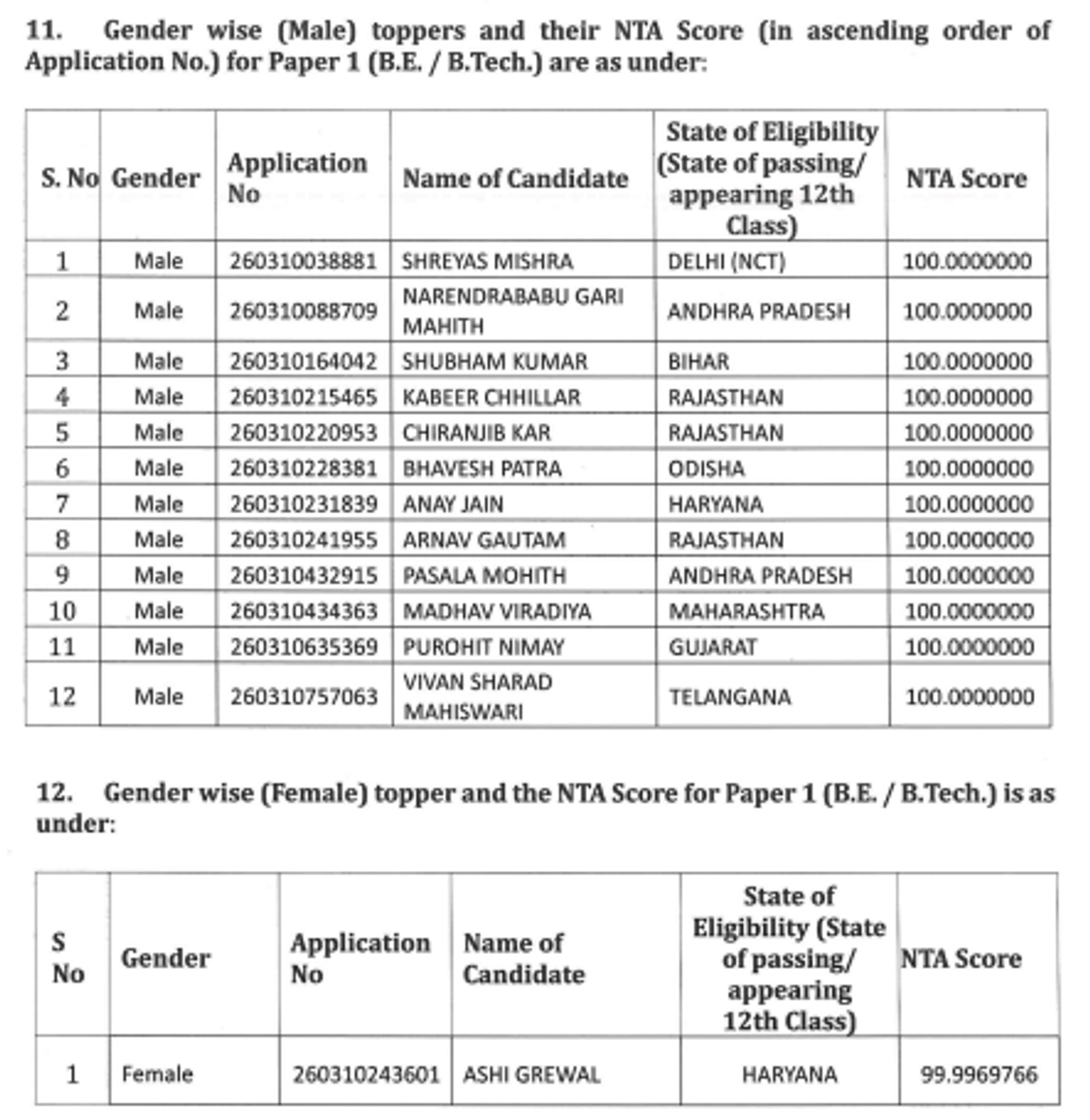The JEE Main 2026 Session 2 Registration is over now, and the correction window is open from today, 27th February 2026, till 28th February 2026 (until 11:50 PM), on the official website, jeemain.nta.nic.in.
In the correction window, all the registered candidates can verify and edit their details in the application form.
The JEE Main 2026 Session 2 Exams will be held from April 2 to April 9, 2026, and the admit cards will be released 3 to 4 days before the exam.
- The JEE Main 2026 Session 1 Results for Paper 1 (B.E./B.Tech) have been released on 16th February 2026, and for Paper 2 (B.Arch/B.Planning) on 24th February 2026.
- The JEE Main Session 1 Results include NTA Score (percentile), Category Rank, and subject-wise percentile scores.
You can download your scorecard by logging in using your application number and password, and the best of 2 sessions will be considered for the final ranking.
With an improvement of around 20-25 marks in session 2, you can boost your percentile, as it is a second opportunity to improve your rank and secure a better college.
Check:
- JEE Mains Topper Marks Out of 300 in 2026
- JEE Main 2026 Session 2 Correction Window
- JEE Main 2026 Session 1 Marks vs Percentile (Expected)
- Predict your rank using Collegedunia’s JEE Main College Predictor

Key Summary
In this Article, we have discussed about JEE Main 2026, including the Result, Final Answer Key, Cutoff, College Predictor and Session 2 Registration.
- As per various coaching institutes, there are around 8-9 dropped questions, for which candidates will be given full marks if attempted.
- For the general category candidate, around 91-94, whereas for OBC/EWS, the percentile will be around 78 to 88.
- Around 75% board marks are mandatory for IIT/NIT Admissions by JoSAA despite qualification in JEE Main.
- In case of a tie, the Maths percentile, then Physics percentile, and age is used for rank tie-breaking.
- If you score below 90 percentile, you can get a seat through state counselling, private universities, and GFTIs using JEE Main scores.
- After JoSAA rounds, CSAB special rounds fill vacant NIT+ seats, giving another admission opportunity for candidates with ranks up to 40,000–80,000+.
- JEE Main 2026 Result Dates
- How to Download JEE Main Result 2026?
- Details Mentioned on JEE Main Scorecard Session 1
- How to Download the JEE Main Final Answer Key & Calculate Your Final Raw Score?
-
- What After JEE Main 2026 Result?
- JEE Main College Predictor
- JEE Main 2026 Session 2 Registration Process
- How Many Candidates Registered for JEE Main Session 2?
- JEE Main 2026 Shift-Wise Marks vs Percentile Analysis
- JEE Main 2026 Safe Score for NITs/IIITs
- JEE Advanced 2026 Eligibility
- JEE Main Seat Matrix 2026 (Expected)
- JEE Main 2026 Reservation Criteria
- JEE Main Counselling 2026
- FAQs for JEE Main 2026
JEE Main Paper 2 Result
The JEE Main Paper 2 Result is out for the candidates who appeared in B.Arch and B.Planning. The JEE Main Scorecard will include the Normalised percentile score, subject-wise & overall score.
| Particulars | Details |
|---|---|
| Exam Name | JEE Main 2026 – Paper 2A (B.Arch) & Paper 2B (B.Planning) |
| Session 1 Exam Dates | January 29, 2026 |
| Provisional Answer Key Release | February 19, 2026 |
| Final Answer Key | 23rd February 2026 (OUT) |
| Result Date (Session 1) | 24th February 2026 (OUT) |
| Result Mode | Online (Scorecard PDF Download) |
| Login Credentials Required | Application Number + Date of Birth/Password |
| Normalization Process | Percentile calculated shift-wise to ensure fairness |
| Admission Through | NITs, IIITs, GFTIs, and other participating institutes |
| Score Validity | Valid for Academic Session 2026–27 |
JEE Main Result Login
The Candidates can check their JEE Main 2026 result on the official website after clicking on the “JEE Main Result 2026 Session-1.

Source: JEE Main Results
JEE Main Topper List
In the JEE Main Result Press Release, NTA has released the list of the total number of candidates registered & appeared in the exam, along with the state-wise toppers, gender-wise toppers & category-wise toppers.
JEE Main Overall Toppers 2026

JEE Main State-Wise Toppers

JEE Main Gender-Wise Toppers

Source: JEE Main Result Release PDF
What After JEE Main 2026 Session 1 Result?
As the JEE Main Session 1 Results are declared, you have received the overall percentile, and can make a strategy before the April Attempt.
The focus should be more on improving your percentile, then preparing for JEE Advanced, managing the board exams and applying for the back entrance exam and colleges.
JEE Main Result: Next Steps Based on Percentile
- The Best Percentile, from both sessions 1 & 2, will be used for the final ranking.
- The AIR and JEE Advanced eligibility will be released only after the Session 2 results.
- You can apply to different entrance exams to increase the admission options.
- Along with JEE Main preparation, also maintain 75% in boards.
- If you have scored above 95 percentile, you should shift towards the Advanced level practice.
- If your score is below 90%, then you should treat your april attempt as the main scoring chance.
| Percentile Range | What It Means | Recommended Focus |
|---|---|---|
| 95%ile & above | Strong position for top NITs/IITs |
|
| 90–95%ile | Borderline for top branches | Focus on the April attempt to boost the percentile; then decide on Advanced |
| Below 90%ile | Needs major improvement |
|
JEE Main 2026 Result Dates
The JEE Main final answer key is out, and the JEE Main 2026 Result has been released. Registration for session 2 is ongoing. You should know the important dates related to the results, session 2 exams & counselling.
| Event | Date |
|---|---|
| Final Answer Key | 16th Feb 2026 |
| Session 1 Result | 16th Feb, 2026 (Out) |
| Session 2 Registration Last Date | Feb 25, 2026 (9 PM) |
| Session 2 Exam Dates | Apr 2 – Apr 9, 2026 |
| Session 2 Admit Card | 3–4 days before the exam |
| Final Rank & AIR Release | After Session 2 |
| JoSAA Counselling Begins | June 2026 (expected) |

Source: JEE Main Information Bulletin
Check: Important Dates for JEE Main 2026
How to Download JEE Main Result 2026?
The JEE Main Result 2026 will be released online on the official website, jeemain.nta.nic.in. You can download the JEE Main Session 1 Scorecard by using the Application Number & password.
You can check this video by @collegedunia to know how to download the JEE Main Result in a step-by-step way.
Check:
Ques. How can I download the JEE Main 2026 scorecard from the official website?
Ans. The JEE Main Scorecard 2026 will be released online on the official website, jeemain.nta.nic.in.
You can log in by using the NTA website and download the PDF scorecard for counselling and admission use.
| Step | Action |
|---|---|
| 1 | Visit jeemain.nta.nic.in |
| 2 | Click on “JEE Main 2026 Result” |
| 3 | Enter login credentials |
| 4 | Download scorecard PDF |
Ques. What login details are required to check the JEE Main 2026 result?
Ans. To check the JEE Main Result, you will require the application number and password.
- These will be the same as those created during the registration process, along with a security pin.
- The result will include Candidate details, application number, Subject-wise percentile, Overall percentile, Raw scores, Exam session and paper.
How to Download the JEE Main Final Answer Key & Calculate Your Final Raw Score?
The JEE Main Final Answer key will be released along with the session 1 result, which will be used to calculate the final raw scores and percentiles.
- You can download the answer key PDF and match it with the response sheet to calculate the final marks before the results are declared.
- To download the JEE Main Final Answer key, no login is required, as it will be released in PDF Form on the homepage of jeemain.nta.nic.in.
How to Calculate JEE Main 2026 Raw Score?
You can calculate the JEE Main Raw Score with the help of the final answer key by simply using the marking scheme.
As per the marking scheme, +4 marks will be given to each correct answer, and -1 mark will be deducted for each incorrect answer.
Formula for Raw Score:
| Raw Score = (Correct Answers × 4) – (Incorrect Answers × 1) |
For Eg:
| Parameter | Example Value |
|---|---|
| Total Correct Answers | 55 |
| Total Incorrect Answers | 10 |
| Marks from Correct Answers | 55 × 4 = 220 |
| Negative Marks | 10 × 1 = 10 |
| Final Raw Score | 220 – 10 = 210 |
After the raw score is calculated, NTA will normalise it to generate the final percentile score, which determines the final rank & eligibility for JEE Advanced & Counselling.
JEE Main Percentile Calculation
The NTA will use the normalisation method to convert raw scores into percentiles across shifts. The Percentile will show the percentage of candidates who scored equal to or below a candidate in that session.
JEE Main Percentile Formula:
| Percentile = (Number of candidates with score ≤ yours ÷ Total candidates in session) × 100 |
For Example:
| Candidate Raw Score | Candidates Below | Total Candidates in Shift | Percentile |
|---|---|---|---|
| 232 | 92,000 | 95,000 | (92,000/95,000)×100 = 96.84 |
| 180 | 70,000 | 95,000 | 73.68 |
| 120 | 40,000 | 95,000 | 42.10 |
Ques. What is a safe score in JEE Main 2026 for NITs and IIITs admission?
Ans. In JEE Main, the Safe Score depends on the category and branch preference. For general candidates, a 170 -220+ score is considered competitive for top NITs/IIITs options.
| Score Range | Admission Chances |
|---|---|
| 220+ | Top NIT CSE |
| 180–220 | Good NIT/IIIT |
| 140–180 | Decent NIT |
| 120–140 | Lower NIT/GFTI |
Ques. What is the expected JEE Advanced 2026 cutoff percentile?
Ans. The JEE Advanced Qualifying cutoff is expected to be around the 93–95 percentile for the General category, based on recent trends and participation levels.
| Category | Expected Percentile Cutoff |
|---|---|
| General | 93–95 |
| OBC/EWS | 90–93 |
| SC | 60–75 |
| ST | 50–65 |
Check:
What After JEE Main 2026 Result?
After the declaration of JEE Main 2026 Session 1 Result, you can check your percentile, have rank expectations and chances of admission.
The Next step will include appearing for session 2, checking for JEE Advanced Eligibility, and preparing for JoSAA Counselling for NITs, IIITs and GFTIs.
Next Steps After the JEE Main Result
- After both sessions are conducted, the best percentile will be used for the Final AIR and Counselling.
- The candidates who are above the required cutoff can register for JEE Advanced 2026.
- If you are targeting NIT/IIIT branches, consider giving the session 2 exam for improvement.
- Start shortlisting colleges based on expected rank and previous cutoffs.
| Step | Timeline | What to Do |
|---|---|---|
| Check Scorecard & Percentile | Immediately after the result | Download and verify details |
| Decide on Session 2 Attempt | Feb 2026 | Reappear for score improvement if needed |
| Session 2 Registration Last Date | Feb 25, 2026 | Apply on the NTA portal |
| JEE Advanced Eligibility Check | After Session 2 | Top 2.5 lakh candidates qualify |
| Final AIR Release | After Session 2 results | Based on the best percentile |
| JoSAA Counselling Registration | June 2026 (expected) | Choice filling for colleges |
| Seat Allotment Rounds | June–July 2026 | Accept/upgrade/freeze seat |
Ques. When will JoSAA counselling for JEE Main 2026 start?
Ans. The JoSAA Counselling is expected to start in June 2026, after the session 2 results and the release of the final rank. This will include registration, choice filling, and seat allotment rounds.
| Stage | Expected Timeline |
|---|---|
| Registration | June 2026 |
| Choice Filling | June 2026 |
| Seat Allotment | June–July 2026 |
Ques. Can I improve my percentile by appearing in JEE Main Session 2?
Ans. Yes, if not satisfied with the session 1 score, you can appear in session 2 to improve your percentile.
The NTA will consider the best percentile of both sessions for the final ranking, without any disadvantage for multiple attempts.
JEE Main College Predictor
The JEE Main College Predictor will help the candidates check which college and branch they can get according to their expected percentiles and rank.
Top Colleges Accepting JEE Main Scores
| Institute Category | College Name | Admission Mode |
|---|---|---|
| NIT | NIT Tiruchirappalli (NIT Trichy) | JoSAA Counselling |
| NIT Surathkal | ||
| NIT Warangal | ||
| NIT Calicut | ||
| IIIT | IIIT Hyderabad | Institute Counselling |
| IIIT Allahabad | JoSAA Counselling | |
| IIIT Bangalore | Institute Counselling | |
| GFTI | IIEST Shibpur | JoSAA / CSAB |
| BIT Mesra | ||
| PEC Chandigarh | ||
| Delhi Govt College | DTU Delhi | JAC Delhi |
| NSUT Delhi | JAC Delhi | |
| State University | Jadavpur University | State Counselling |
| Private (JEE Main Based) | LNMIIT Jaipur | Institute Counselling |

JEE Main 2026 Session 2 Registration Process
The NTA has released the JEE Main 2026 Application form for Session 2 for candidates who want to improve their percentile and have missed Session1 for better college options.
As NTA will consider the best score out of both sessions, session 2 is highly important for candidates.
| Particulars | Details |
|---|---|
| Registration Mode | Online |
| Official Website | jeemain.nta.nic.in |
| Registration Window | Feb 1 – Feb 25, 2026 (up to 9:00 PM) |
| Form Correction Window | Last week of February 2026 |
| Eligible Candidates | Appeared in Session 1 or for new applicants |
| Number of Attempts Allowed | 2 (Session 1 & Session 2) |
| Score Considered | Best of two sessions |
How to apply for JEE Main 2026 Session 2?
To apply for JEE Main 2026 Session 2, you have to follow a few simple steps, including registration, documents & fees submission.
Check this video by @collegedunia to know about the step-by-step process of JEE Main Session 2 Registration.
How Many Candidates Registered for JEE Main Session 2?
Every year, a large number of candidates appear for JEE Main Session 2 after Session 1, to improve their score or because they have missed the first attempt.
Check year-wise registration statistics for candidates appearing in session 2 & session 1, as per the official data from NTA and exam statistics:
- In Years 2024 & 2025, the candidates registered in session 2 are the same as those in session 1, showing a high interest in the improvement session.
- In 2023, the registration for session 2 was more than for session 1.
- As the NTA chooses the best scores out of 2 sessions for ranking, the candidates choose to sit in both sessions to increase their score.
| Year | Session 1 Registered Candidates | Session 2 Registered Candidates | % Increase from Session 1 to Session 2 |
|---|---|---|---|
| 2025 | 13,11,544 | 10,61,840 | 81% of Session 1 |
| 2024 | 12,21,624 | 11,79,569 | 97% of Session 1 |
| 2023 | 8,60,064 | 9,31,334 | 108% of Session 1 |
| 2022 | 8,72,970 | 6,22,034 | 71% of Session 1 |
JEE Main 2026 Shift-Wise Marks vs Percentile Analysis
The JEE Main Percentile will be calculated by using the shift-wise normalisation, so the raw marks will differ for each day as per the shift.The JEE Main Percentile will be your relative performance as per the overall session’s performance, depending on the shift-wise difficulty.
Check an expected range of Marks vs percentile, the actual percentiles will depend on shift-wise performance and score distribution.
JEE Main Overall Shift-Wise Marks vs Percentile (Expected)
- The JEE Main Marks vs Percentile will differ as per the candidate’s shift, but the normalisation will ensure rank fairness in the shifts.
- With a difference of 5-10 marks, your result percentile can still be the same.
- Maths is the most-time consuming, which also shows fewer marks for the same percentile.
- Inan easier shift, the marks will be higher for the same percentile, because of a better average performance.
| Percentile Range | Easier Shifts (High Scoring) | Moderate Shifts | Tougher Shifts (Time-Consuming) |
|---|---|---|---|
| 99+ | 195–205 | 188–198 | 180–190 |
| 98–99 | 178–194 | 170–187 | 162–175 |
| 95–97 | 158–177 | 150–169 | 142–155 |
| 90–94 | 138–157 | 130–149 | 122–135 |
| 85–89 | 122–137 | 115–129 | 108–120 |
Also Read:
JEE Main 2026 Safe Score for NITs/IIITs
As more than 13 lakh candidates appeared in JEE Main Session 1, the competition for NITs and IIITs is expected to be high in 2026.
A “Safe Score” depends upon the branch preference, category, and college tier, but data trends from recent years suggest that scoring 170–220+ significantly improves chances for top branches and institutes.
JEE Main Category-Wise Safe Score Estimate
| Category | Safe Score for Top NITs/IIITs | Safe Score for Decent NIT/IIIT | Expected Percentile Range |
|---|---|---|---|
| General (UR) | 200 – 230+ | 140 – 180 | 96 – 99.5 |
| EWS | 190 – 220 | 130 – 170 | 95 – 99 |
| OBC-NCL | 180 – 210 | 120 – 160 | 94 – 98.5 |
| SC | 120 – 150 | 90 – 120 | 80 – 94 |
| ST | 90 – 120 | 70 – 100 | 70 – 90 |
| PwD | 70 – 100 | 50 – 80 | 60 – 85 |

Also Check:
JEE Advanced 2026 Eligibility
The Eligibility of JEE Advanced will be completed after both JEE Main Sessions. The Top 2.5 lakh candidates of all the categories in JEE Main 2026 will be eligible to appear for JEE Advanced admission into IITs.
JEE Advanced Eligibility Criteria
- The JEE Advanced eligibility is based on the best percentile of both JEE Main Sessions.
- Around 2.5 Lakh candidate qualify for the exam every year, out of which only 1.6 to 1.8 lakh candidates actually appear.
- For the general category, a 95+ percentile is usually safe for qualification for JEE Advanced.
| Criteria | Requirement |
|---|---|
| JEE Main Qualification | Among the top 2.5 lakh candidates (all categories combined) |
| Cutoff Percentile (General – expected) | 93–95 percentile |
| Cutoff Percentile (OBC/EWS – expected) | 90–93 percentile |
| Cutoff Percentile (SC/ST – expected) | 50–75 percentile |
| Attempts Allowed | Maximum 2 attempts in consecutive years |
| Class 12 Requirement | Passed in 2025 or appearing in 2026 |
| Age Limit | Born on/after Oct 1, 2001 (relaxation for reserved categories) |
Check: JEE Main vs JEE Advanced
JEE Main Seat Matrix 2026 (Expected)
The JEE Main seat matrix 2026 is expected to provide around 42,000-43,000 seats across the NITs, IIITs, and GFTIs, increased to 60,000 with IITs included.
- NITs lead with 24,500–25,000 seats, followed by 9,800–10,000 in IIITs and 11,000 in GFTIs, with a steady 3–4% yearly increase driven by new courses and female supernumerary seats.
- The General category candidates will have the largest share of seats, while EWS will have around 7-8%, and the PwD category will have the horizontal reservation.
JEE Main Institute-Wise Seat Matrix (Expected)
| Institute Type | Number of Institutes | Approx B.Tech Seats |
|---|---|---|
| NITs | 31 | 24,000 |
| IIITs | 26 | 10,000 |
| GFTIs | 40+ | 11,000 |
| Total Seats | — | 43,000- 45,000 |
IIT seats (~17,000), which are filled through JEE Advanced, are not included here.
Also Check: JEE Main Seat Matrix 2026
JEE Main 2026 Reservation Criteria
In JEE Main, the Seat allocation by JoSAA will follow the Government of India policies. These reservations will apply across NITs, IIITs and Most GFTIs, with additional home-state quotas in NITs.
JEE Main Category-Wise Reservation
| Category | Reservation Percentage |
|---|---|
| EWS | 10% |
| OBC-NCL | 27% |
| SC | 15% |
| ST | 7.5% |
| PwD (within each category) | 5% |
| Female Supernumerary Seats | 20% (in select institutes) |
| Home State Quota (NITs) | 50% seats |
Also Check:
JEE Main Counselling 2026
The JEE Main Counselling for NITs, IIITs and GFTIs will be conducted by JoSAA after the release of the final AIR after Session 2.
The JEE Main Counselling process is completely online and includes registration, choice filling, multiple seat allotment rounds, and final admission confirmation.
| Stage | Timeline (Expected) | Detailed Explanation |
|---|---|---|
| JoSAA Registration | June 2026 | Candidates log in using JEE Main credentials and complete counselling registration. Only registered candidates can participate in seat allotment. |
| Choice Filling | June 2026 | Fill and arrange NIT/IIIT/GFTI branches in order of preference. More choices increase the chances of allotment. Lock choice before the deadline. |
| Mock Allotment Rounds | June 2026 | JoSAA releases 1–2 mock allotments. The candidates should understand the possible seat outcomes and modifies choices accordingly. |
| Round 1 Seat Allocation | June 2026 | First official allotment based on AIR, category, and preferences. Candidates must choose Freeze/Float/Slide and pay the seat acceptance fee. |
| Document Upload & Verification | After allotment | Upload the required documents online for verification. Failure to verify can lead to seat cancellation. |
| Subsequent Rounds (2–6) | June–July 2026 | Candidates can upgrade seat using the Float/Slide options. Cutoffs drop slightly in later rounds. |
| Final Seat Allotment | July 2026 | The last round confirms the final institute and branch. No further upgrades after this stage. |
| Reporting to the Institute | July–Aug 2026 | Candidates report to the allotted institute (online/offline) and complete admission formalities. |
Also Check: JEE Main Counselling 2026
FAQs for JEE Main 2026
Ques. When will the JEE Main 2026 Session 1 result be declared?
Ans. The JEE Main 2026 Session 1 result is officially expected to be released on 12th Feb 2026; it can also be released on the evening of 11th Feb as well, along with the final answer key.
| Event | Date (Expected) |
|---|---|
| Final Answer Key | Feb 11–12, 2026 |
| Session 1 Result | By Feb 12, 2026 |
| Scorecard Download | Same day as the result |
Ques. When will the JEE Main 2026 final answer key be released?
Ans. The JEE Main Final Answer key is expected to be released before the Session 1 Result. On the basis of the final answer key, the result will be released.
JEE Main Answer Key Timeline
| Stage | Status |
|---|---|
| Provisional Key | Released |
| Objection Window | Closed |
| Final Key | Before result |
| Result | After the final key |
Ques. How can I calculate my JEE Main 2026 raw score using the answer key?
Ans. To calculate your score, you can match your responses with the final answer key and use the marking scheme to estimate your raw marks before normalisation.
JEE Main Score calculation Formula:
Raw Score = (Correct × 4) – (Incorrect × 1)
Ques. How many candidates appeared for JEE Main 2026 Session 1?
Ans. Around 13.5 lakh candidates registered for JEE Main Session 1, from which 13,00,368 candidates appeared.
The attendance rate of 96%, showing high competition in the exam.
Ques. What are the total seats available through JEE Main 2026 counselling?
Ans. The total JEE Main Scores used for Admission in NITs, IIITs, and GFTIs are around 45,000 B.Tech Seats.
| Institute Type | Seats |
|---|---|
| NITs | 24,000 |
| IIITs | 9,000 |
| GFTIs | 11, 000 |
| Total | 45, 000 |
Ques. What should I do after the JEE Main 2026 result is declared?
Ans. After the JEE Main Session 1 result is declared, you can analyse percentile, predict rank, and plan next steps like Session 2 attempt or counselling preparation.
Next Steps after result declaration are:
| Step | Action |
|---|---|
| Download scorecard | Check percentile |
| Decide Session 2 | Improve score if needed |
| Track AIR release | After Session 2 |
| Prepare for JoSAA | Shortlist colleges |





.jpeg?h=112&w=263&mode=stretch)


.jpeg?h=112&w=263&mode=stretch)

 (29) (1).png?h=112&w=263&mode=stretch)





Comments